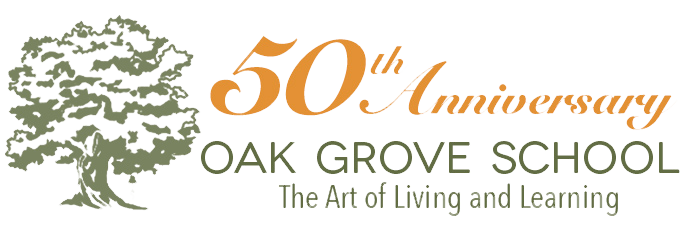The Intention Behind Capstone Projects
Furthering Understanding and Purpose for 8th and 12th Grade Students
Presenting our students with purposeful projects that deepen self-knowledge and foster a sense of curiosity, as well as independent problem-solving skills, forms an integral part of our curriculum at Oak Grove School.
Our 8th and 12th grade students embark on capstone projects each year that lead them away from the classroom and into the world beyond. Through the 8th grade “Into the Wild” and 12th grade “Pathless Projects,” students have the opportunity to explore a deeper sense of purpose within their learning, to challenge themselves with something, and contribute to their community meaningfully.
Through these projects, students gain a deeper understanding of themselves as they stretch by designing their own learning journey while also gaining the life skill of knowing when to ask for help from their community.
“While one is young is the time to investigate, to experiment with everything. The school should help its young people to discover their vocations and responsibilities, and not merely cram their minds with facts and technical knowledge; it should be the soil in which they can grow without fear, happily and integrally.”
J. Krishnamurti
Faculty, students, families, and even buddies had the opportunity to enjoy 8th grade presentations in the Gazebo.
8th Grade: “Into the Wild”
“Into the Wild” is the 8th grade capstone, an independent studies project that encourages our 8th grade students to explore a topic of interest that extends beyond the classroom and into the wild world beyond. Spanning the entire school year, projects and presentations are limitless. This year our students’ projects ranged from a cookbook to a self-built computer, an illustrated comic book, basketball coaching, photography, an in-depth guide on three musical genres, book on dog training, and a short film.
Once decided on the topic of their “Into the Wild” project, students are supported to recruit a mentor, who is an expert in the field of study they have chosen, and who can provide them with a deeper insight into their chosen area of interest.
Throughout the project, students blog about their process to the Oak Grove community, allowing them not only to develop their own style and voice but also share their progress with an authentic audience, reflect on the essential learnings and experiences, and set goals for the future. Leading them away from campus, students create their own field trip relating to their project and invite a classmate to attend. Locations may include an art exhibit, a business or office, a speaker, a theater performance, an interesting place in Ventura County or other nearby location that students have not visited before.
A final requirement for their project is community involvement and impact, and finding a way to connect their project to a charitable organization. Students can volunteer at a non-profit; lead a club or workshop within the school day that helps educate and energize the community; or organize, plan, and execute a fundraising event for a specific cause.
The “Into the Wild” project culminates with a final presentation toward the end of the year, during which students share their learning journey with the entire Oak Grove community.
Jitari shows students how to perform basic vehicle maintenance. “So they can see it’s nothing scary, it can save them some money, and it’s fun to do with friends.”
12th Grade: “Pathless Projects”
As our high school seniors become ready for the world they are about to enter, they are challenged academically, socially, physically, and emotionally to prepare for the path that awaits them.
Outside of their classroom, Oak Grove seniors embark on a three-week journey to India and, as a capstone experience, they complete their “Pathless Project,” which is an opportunity for them to design and execute an independent project of their own making. While adults provide support and guidance, the students are the drivers of the projects, and from the experience and the real possibility of failure, learn a great deal about how to manage their own deadlines, experience, and expectations.
There are only three requirements for their “Pathless Project”: It must be a significant challenge for the student, it must help the student develop a sense of purpose in their life, and finally, the project must give back to the community in a meaningful way.
Because of the freedom that the students are given, each project is unique and tailored to the student’s own abilities, passions, and potential. Examples from previous years include a campaign to raise awareness of plastic waste, a hand-drawn animated short film, and a study of art and child development. This year, projects included a charity 3 x 3 basketball tournament, a series of charity and on-campus yoga classes, a documentary film, a mural for the English classroom, and a sexual health and wellness initiative.
A student’s “Pathless Project” concludes with a demonstration to a live audience during their Gateway presentation. Accompanying their speech, the student also uses audio-visual tools or other props to express their process and findings.
Mateo led Yoga classes with every grade level and held classes at a local studio with proceeds going to non-profit organizations.
Lucia’s painting depicting her love for art and literature will hang in the high school English classroom.
Surya’s short documentary about changes at Oak Grove School including interviews with former and current teachers and administrators.









